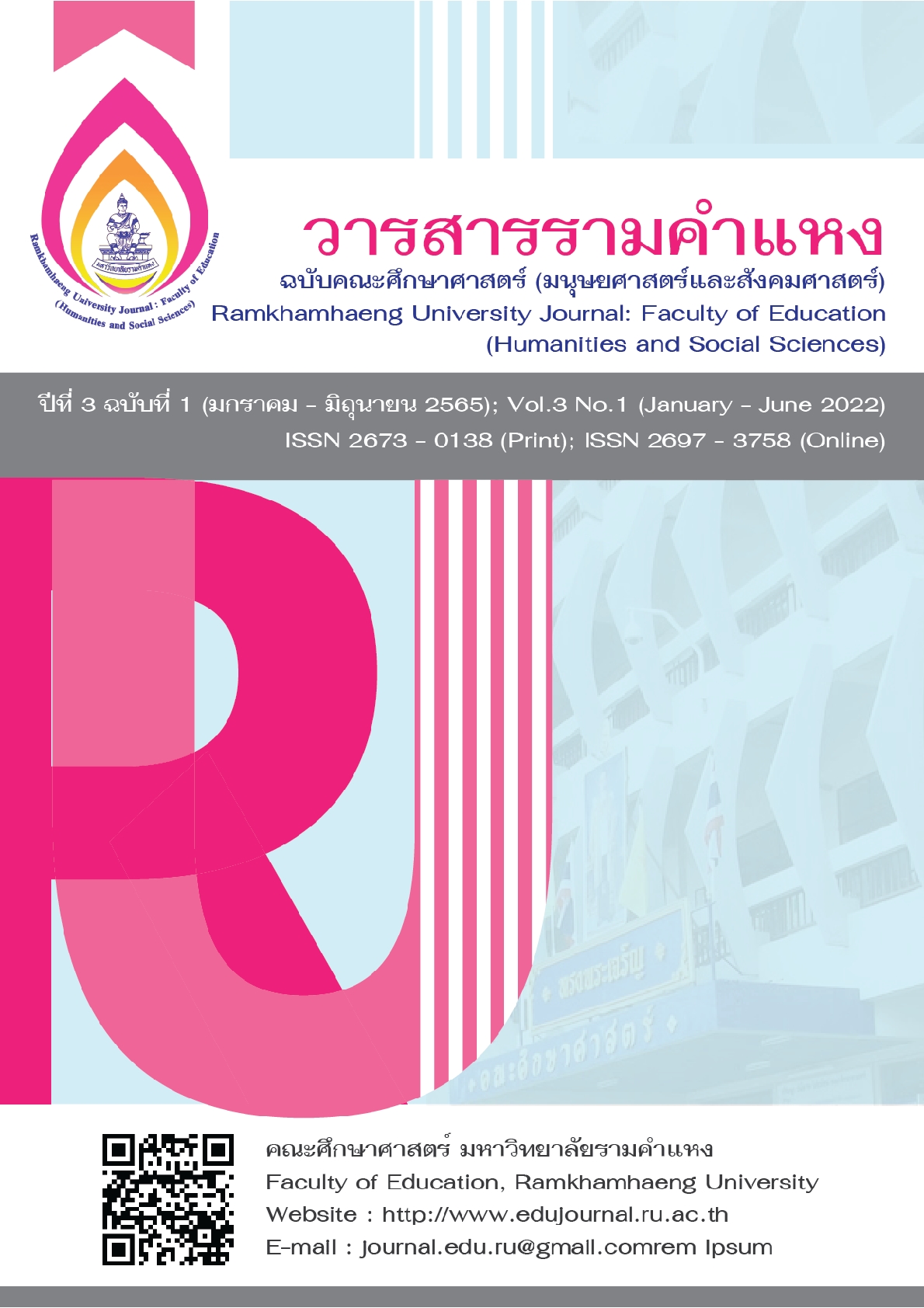Development of the coaching model focusing on the enhancement of teacher’s learning management competency for media literacy of high school students
Main Article Content
Abstract
The study aimed to: 1) develop a coaching model that focuses on enhancing a teacher's learning management competency for media literacy of high school students, and 2) assess the model's effectiveness. The data was collected using research and development approaches with 8 instructors and 35 students from Matthayomsuksa 4/1 throughout the academic year of 2021 by using simple random sampling. The data was then analyzed by averaging, standard deviation, content analysis, and statistical t-test. The results revealed that: (1) the developing coaching model was structured as the ICIE Coaching Model and included the main components of principles, objectives, and process components. The implementation period was divided into 4 phases: Phase 1: Initiation; Phase 2: Collaboration; Phase 3: Implementation; and Phase 4: Evaluation. Meanwhile, 2) the main findings on the effectiveness of the developing coaching model revealed that (2.1) instructors' media literacy learning management competency was higher than before using the model, (2.2) students' media literacy ability was significantly higher than before using the model at the statistical level of 0.05, and (2.3) students were satisfied with the learning management of teachers who used the coaching model at a high level (M=4.21, SD=0.53). Finally, (2.4), the instructors who employed the model expressed a high level of satisfaction (M=4.49, SD=0.57).
Downloads
Article Details

This work is licensed under a Creative Commons Attribution-NonCommercial-NoDerivatives 4.0 International License.
ผู้ส่งบทความ (และคณะผู้วิจัยทุกคน) ตระหนักและปฎิบัติตามจริยธรรมการวิจัยอย่างเคร่งครัด ทั้งนี้บทความ เนื้อหา ข้อมูล ข้อความ ภาพ ตาราง แผนภาพ แผนผัง หรือข้อคิดเห็นใดๆ ที่ปรากฎในบทความ เป็นความคิดเห็นและความรับผิดชอบของผู้ส่งบทความ กองบรรณาธิการไม่จำเป็นต้องเห็นตามเสมอไป และไม่มีส่วนรับผิดชอบใดๆ โดยถือเป็นความรับผิดของของเจ้าของบทความเพียงผู้เดียว
References
Chuenklin, T., & Laowreandee, W. (2012). The development of coaching model to enhance nursing instructors’ competency that promotes critical thinking skills of nursing students in praboromarachanok institute, ministry of public health. Silpakorn Educational Research Journal, 4(1), 112-129. (in Thai)
Costa, A., & Garmston, R. (2002). Cognitive coaching: A foundation for renaissance schools. New York: Christopher-Gordon Publishers.
Dick, W., Carey, L., & Carey, J. O. (2005). The systematic design of instruction (6th ed.). Boston: Pearson.
Joyce, B., & Weil, M., & Showers, B. (1992). Model of teaching (4th ed.). Boston: Allyn and Bacon.
Khammani, T. (2007). Pedagogical science (6th ed.). Bangkok: Dan Sutta printing. (in Thai) Kruse, K. (2007). Instruction to instructional design and the ADDIE model. Retrieved June 10, 2013, from http://www.e-learningguru.com/articles/art11.htm
Kunarak, K. (2002). Instructional design. Bangkok: Faculty of Education Silpakorn University (in Thai).
National Statistical Office. (2016). Executive summary: Use of information and communication technology. Bangkok: National Statistical Office. (in Thai).
Office of the National Economic and Social Development Board. (2017). Economic and social development plan national Issue No. 12 (2017 - 2021). Bangkok: Author. (in Thai).
Phattarasatjatum, P. et al. (2020). Development of an integrated social media and technology based coaching model for developing early childhood healthcare competencies of caregivers in local administration organization childcare centers. Journal of The Royal Thai Army Nurses, 22(3), 123-134. (in Thai)
Rodsin, P., Lemjinda, M., & Otjanalert, N. (2020). The development of a learning management model for secondary school Thai language teachers to enhance analytical reading thinking skills by using metacognition strategies with coaching. Journal of Graduate Studies and Social Sciences, Uttaradit Raja Bhat University, 10(1), 16-27. (in Thai).
Sripairote, T., Sombatwattana, P., & Yoelao, D. (2018). Influence of project-based learning coaching program on teacher competency. Veridian E-Journal, Silpakorn University, 11(2), 96-110. (in Thai).
Thien Thai, J. (2020). Impact of social media Towards changes in Thai society and culture. Retrieved June 10, 2013, from https://www.chula.ac.th/news/27969/
United Nations Educational, Scientific and Cultural Organization (UNESCO). (2013) . Intangible cultural heritage domains. Retrieved June 10, 2013, from http://www.unesco.org/culture/ich/doc/src/01857-EN.pdf
Whitmore, J. (2017). Coaching for performance. London: Nicholas Brealey. Wongyai, W.. & Phatphon, M. (2014). Coaching for cognition (3rd ed.). Bangkok: Charansanitwong. (in Thai).
Zwart, R. C. et al. (2008). Teacher learning through reciprocal peer coaching: An analysis of activity sequences. Teaching and Teacher Education, 24, 981-1002.


